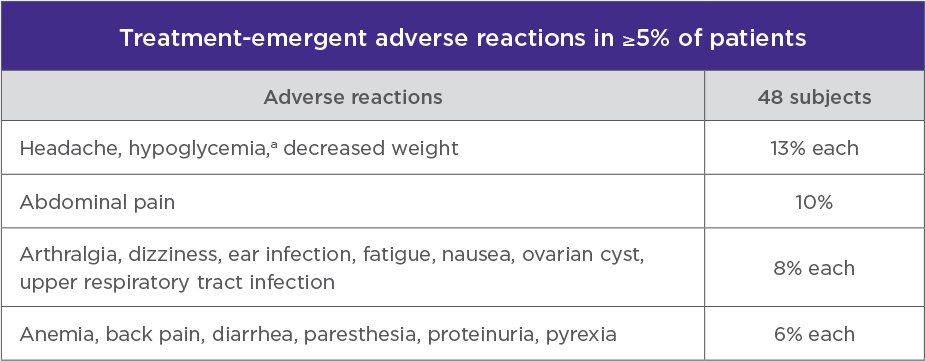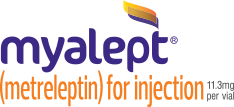

Adverse reactions of 5% or greater incidence in patients with generalized lipodystrophy receiving Myalept in an open-label, single-arm study

- a Hypoglycemic events were assessed as mild, moderate, severe, or life threatening based on the protocol-specified definitions: mild: documentation of low plasma glucose values with no symptoms; moderate: presence of clinical symptoms requiring ingestion of glucose, self-alleviated; severe: presence of neuroglycopenic symptoms requiring assistance from others for alleviation; life threatening: loss of consciousness and/or requiring intervention by administration of intravenous glucose or intramuscular glucagon.
- Six patients (13%) had 7 adverse reactions of hypoglycemia. Six events occurred in the setting of concomitant insulin use, with or without oral antihyperglycemic agents.
- Two patients (4%) with generalized lipodystrophy reported injection-site erythema and urticaria.
- Two patients (4%) had events of pancreatitis. Both patients had a medical history of pancreatitis.
As with all therapeutic proteins, there is potential for immunogenicity.
- Anti-metreleptin antibodies were detected in 84% (36/43) of patients with generalized lipodystrophy studied in the Myalept trials. The magnitude and persistence of the observed anti-drug antibody responses is not understood.
- Anti-metreleptin antibodies associated with adverse events consistent with loss of endogenous leptin activity and/or loss of Myalept efficacy were observed in 6% (2/33) of the patients with generalized lipodystrophy tested.
- Adverse events reported in these 2 patients included severe infections and worsening of metabolic control (increases in HbA1c and/or triglycerides).
- Test for anti-metreleptin antibodies with neutralizing activity in patients who develop severe infections or show signs suspicious for loss of Myalept efficacy during treatment. Contact Chiesi Farmaceutici S.p.A. at 1-866-216-1526 for neutralizing antibody testing.
Hypoglycemia with concomitant use of insulin or insulin secretagogues
- Dosage adjustments, including possible large reductions, of insulin or insulin secretagogue (e.g., sulfonylurea) may be necessary in some patients to minimize the risk of hypoglycemia.
- Closely monitor blood glucose in patients on concomitant insulin therapy, especially those on high doses, or insulin secretagogue, when treating with Myalept.
A Closer Look: Lymphoma Risk
Cases of lymphoma have been reported in the Myalept clinical trial program with no evidence to date suggesting a connection to treatment.
- Three cases of T-cell lymphoma were reported
- In all three cases, the patients had acquired GL
Patients with acquired GL have a high risk for lymphomas due to the natural course of disease.
Acquired lipodystrophies are associated with autoimmune disorders, and autoimmune disorders are associated with an increased risk of malignancies including lymphomas.
The benefits and risks of Myalept treatment should be carefully considered in patients with acquired generalized lipodystrophy and/or those with significant hematologic abnormalities (including leukopenia, neutropenia, bone marrow abnormalities, lymphoma, and/or lymphadenopathy).
INDICATION: MYALEPT® (metreleptin) for injection is a leptin analog indicated as an adjunct to diet as replacement therapy to treat the complications of leptin deficiency in patients with congenital or acquired generalized lipodystrophy.
LIMITATIONS OF USE: The safety and effectiveness of MYALEPT for the treatment of complications of partial lipodystrophy or for the treatment of liver disease, including nonalcoholic steatohepatitis (NASH), have not been established.
MYALEPT is not indicated for use in patients with HIV-related lipodystrophy. MYALEPT is not indicated for use in patients with metabolic disease, including diabetes mellitus and hypertriglyceridemia, without concurrent evidence of generalized lipodystrophy.
WARNING: RISK OF ANTI-METRELEPTIN ANTIBODIES WITH NEUTRALIZING ACTIVITY AND RISK OF LYMPHOMA
Anti-metreleptin antibodies with neutralizing activity have been identified in patients treated with MYALEPT. The consequences of these neutralizing antibodies are not well characterized but could include inhibition of endogenous leptin action and/or loss of MYALEPT efficacy. Severe infection and/or worsening metabolic control have been reported. Test for anti-metreleptin antibodies with neutralizing activity in patients who develop severe infections or show signs suspicious for loss of MYALEPT efficacy during treatment. Contact Chiesi Farmaceutici S.p.A. at 1-866-216-1526 for neutralizing antibody testing of clinical samples.
T-cell lymphoma has been reported in patients with acquired generalized lipodystrophy, both treated and not treated with MYALEPT. Carefully consider the benefits and risks of treatment with MYALEPT in patients with significant hematologic abnormalities and/or acquired generalized lipodystrophy.
Because of these risks associated with the development of anti-metreleptin antibodies that neutralize endogenous leptin and/or MYALEPT and the risk for lymphoma, MYALEPT is available only through a restricted program under a Risk Evaluation and Mitigation Strategy (REMS) called the MYALEPT REMS PROGRAM.
CONTRAINDICATIONS: MYALEPT is contraindicated in general obesity not associated with congenital leptin deficiency. MYALEPT has not been shown to be effective in treating general obesity. The development of anti-metreleptin neutralizing antibodies have been reported in obese patients treated with MYALEPT. MYALEPT is contraindicated in patients with prior severe hypersensitivity reactions to metreleptin or to any of its components.
WARNINGS AND PRECAUTIONS: A dose adjustment, including possible large reductions, of insulin or insulin secretagogue may be necessary in some patients to minimize risk of hypoglycemia. Closely monitor blood glucose in patients on concomitant insulin, especially those on high doses, or insulin secretagogue.
Cases of progression of autoimmune hepatitis and membranoproliferative glomerulonephritis (associated with massive proteinuria and renal failure) were observed in some patients with acquired generalized lipodystrophy treated with MYALEPT. A causal relationship between MYALEPT and the development and/or progression of autoimmune disease has not been established. Carefully consider the benefits and risks of MYALEPT treatment in patients with autoimmune disease.
Hypersensitivity reactions (eg, anaphylaxis, urticaria or generalized rash) have been reported. Patient should promptly seek medical advice about discontinuation of MYALEPT if a hypersensitivity reaction occurs.
MYALEPT contains benzyl alcohol when reconstituted with Bacteriostatic Water for Injection. The preservative benzyl alcohol has been associated with serious adverse events and death in pediatric patients, particularly in neonates and premature infants. Preservative-free Water for Injection is recommended for use in neonates and infants.
ADVERSE REACTIONS: Most common adverse reactions (≥10%) in clinical trials were headache, hypoglycemia, decreased weight, and abdominal pain.
Please see full Prescribing Information, including Boxed Warning.
INDICATION: MYALEPT® (metreleptin) for injection is a leptin analog indicated as an adjunct to diet as replacement therapy to treat the complications of leptin deficiency in patients with congenital or acquired generalized lipodystrophy.
LIMITATIONS OF USE: The safety and effectiveness of MYALEPT for the treatment of complications of partial lipodystrophy or for the treatment of liver disease, including nonalcoholic steatohepatitis (NASH), have not been established.
MYALEPT is not indicated for use in patients with HIV-related lipodystrophy. MYALEPT is not indicated for use in patients with metabolic disease, including diabetes mellitus and hypertriglyceridemia, without concurrent evidence of generalized lipodystrophy.
WARNING: RISK OF ANTI-METRELEPTIN ANTIBODIES WITH NEUTRALIZING ACTIVITY AND RISK OF LYMPHOMA
Anti-metreleptin antibodies with neutralizing activity have been identified in patients treated with MYALEPT. The consequences of these neutralizing antibodies are not well characterized but could include inhibition of endogenous leptin action and/or loss of MYALEPT efficacy. Severe infection and/or worsening metabolic control have been reported. Test for anti-metreleptin antibodies with neutralizing activity in patients who develop severe infections or show signs suspicious for loss of MYALEPT efficacy during treatment. Contact Chiesi Farmaceutici S.p.A. at 1-866-216-1526 for neutralizing antibody testing of clinical samples.
T-cell lymphoma has been reported in patients with acquired generalized lipodystrophy, both treated and not treated with MYALEPT. Carefully consider the benefits and risks of treatment with MYALEPT in patients with significant hematologic abnormalities and/or acquired generalized lipodystrophy.
Because of these risks associated with the development of anti-metreleptin antibodies that neutralize endogenous leptin and/or MYALEPT and the risk for lymphoma, MYALEPT is available only through a restricted program under a Risk Evaluation and Mitigation Strategy (REMS) called the MYALEPT REMS PROGRAM.
CONTRAINDICATIONS: MYALEPT is contraindicated in general obesity not associated with congenital leptin deficiency. MYALEPT has not been shown to be effective in treating general obesity. The development of anti-metreleptin neutralizing antibodies have been reported in obese patients treated with MYALEPT. MYALEPT is contraindicated in patients with prior severe hypersensitivity reactions to metreleptin or to any of its components.
WARNINGS AND PRECAUTIONS: A dose adjustment, including possible large reductions, of insulin or insulin secretagogue may be necessary in some patients to minimize risk of hypoglycemia. Closely monitor blood glucose in patients on concomitant insulin, especially those on high doses, or insulin secretagogue.
Cases of progression of autoimmune hepatitis and membranoproliferative glomerulonephritis (associated with massive proteinuria and renal failure) were observed in some patients with acquired generalized lipodystrophy treated with MYALEPT. A causal relationship between MYALEPT and the development and/or progression of autoimmune disease has not been established. Carefully consider the benefits and risks of MYALEPT treatment in patients with autoimmune disease.
Hypersensitivity reactions (eg, anaphylaxis, urticaria or generalized rash) have been reported. Patient should promptly seek medical advice about discontinuation of MYALEPT if a hypersensitivity reaction occurs.
MYALEPT contains benzyl alcohol when reconstituted with Bacteriostatic Water for Injection. The preservative benzyl alcohol has been associated with serious adverse events and death in pediatric patients, particularly in neonates and premature infants. Preservative-free Water for Injection is recommended for use in neonates and infants.
ADVERSE REACTIONS: Most common adverse reactions (≥10%) in clinical trials were headache, hypoglycemia, decreased weight, and abdominal pain.


